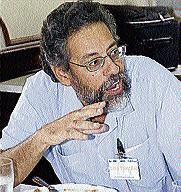
Peter Figueroa
The first HIV vaccine trial in Jamaica has begun with 24 persons who have volunteered to be tested from an experimental vaccine. Beginning today, The Sunday Gleaner will carry a diary of persons participating in the study. Dr. Peter Figueroa, chief of epidemiology and AIDS at the Ministry of Health, said it was not possible for persons to contract HIV or develop AIDS from the experimental vaccine. "I must stress that it is not possible to get HIV infection or develop AIDS from experimental vaccines< because they are not made from live HIV, killed HIV (or) weakened HIV or infected cells," he stated
"I know persons infected with the (HIV) virus and even someone who is deliberately spreading it. I want to help in the fight against HIV and AIDS." These are just a few of the reasons Onielgave for participating in the HIV vaccine trials that are now being conducted by the Ministry of Health.
Oniel, who is a 32-year-old self-employed father of two children, said he heard about the HIV vaccine trials from his neighbour who was participating in a similar study at Comprehensive Health Centre.
"I decided to go there to hear more about it. After hearing the information about the vaccine and also the state of HIV in the world, I gladly decided to volunteer," he explained.
A world with no HIV
"I volunteered because I want to help others. The disease is getting out of hand - things are bad. I want to help in the fight against HIV and AIDS. I would like to be around to see a world with no HIV," Oniel continued.
And if that is not enough motivation, he said his young niece and others in her age group also inspired him to become a participant in the trials.
"I am doing it for the younger generation, I would like them to grow up in a world free of HIV," he continued.
But while Oniel is confident about his choice, how did his family react to his decision?
"I told all my family members and my friends about my decision to volunteer, but when I tried to get some of them to think about participating, they were willing but afraid. They said they were afraid of the needles that would be used to take blood. Some were afraid to have their HIV test done which would determine if they could participate, as only HIV-negative people can volunteer. My 12-year-old daughter, who was reading about HIV on the Internet, said she wanted to volunteer too but I told her that she was too young as only persons between the ages of 18 and 50 can volunteer," Oniel stated.
Oniel then explained what happened next.
"Before I could participate in the study, I had to go through a screening process to see if I would be allowed to participate. Then I went through the informed consent process, where I was given a lot of information on HIV and the vaccine trials. Everything that was going to happen was explained to me and all my questions were answered. The staff at the clinic made me feel very comfortable," Oniel continued.
Oniel thinks that members of the public should learn more about the processes involved, before they decide whether or not they would like to participate in the study.
"It is your choice. I think the programme is good but you should come and learn about it from the staff and then make your decision."
Follow Oniel and other participants in the HIV vaccine trials on their courageous journey. Next week, find out, what it was like for Oniel when he received his first vaccination.
Name changed to protect identity.
Why is a vaccine needed?
There is no cure for AIDS. Drugs to treat AIDS are increasingly available and have improved the quality of life of persons living with HIV/AIDS. However, developing a safe, affordable HIV vaccine that will prevent HIV infection is the best hope for controlling the AIDS epidemic.
Why HIV vaccine research in Jamaica?
The HIV/AIDS epidemic is increasing in Jamaica.
To see whether the experimental vaccine can work in the Jamaican population.
To join the global effort in helping to find a safe and effective HIV-preventive vaccine.
Who can volunteer for HIV vaccine trials?
Persons who are:
Healthy
HIV-negative
Between 18 and 60 years
Willing to spend 12 months or more in a follow-up study.
You cannot get HIV from the experimental vaccine.
To find out more about the HIV vaccine trials visit the Epidemiology Research and Training Unit (ERTU), 55 Slipe Pen Road,Kingston 5, Jamaica or call 922-4873/922-4461. Email: jamaicahvtu@yahoo.com
Send comments or questions regarding this article to andrea.downer@gleanerjm.com.

